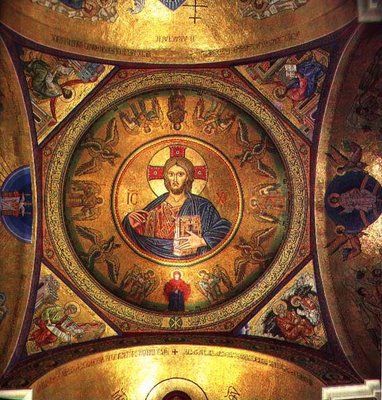But as for you man of God, shun all this; aim at righteousness, godliness, faith, love, steadfastness. Fight the good fight of the faith; take hold of the eternal life to which you were called when you made the good confession in the presence of many witnesses (1 Tim 6:11-12).
At times, there are certain sayings that conjure up fear or euphoria. Examples such as “I get it,” or “I should have known better” immediately bring to mind situations or events that spawned these types of comments. In a Catholic World View of things, certain comments take on certain biblical characteristics i.e. “you are the salt of the earth” (Mt 5:13); or “judge that you not be judged” (Mt 7:1); or “Get behind me, Satan” (Mt 16:23). Though these examples are not exhaustive, you get the meaning behind each one. These biblical nuggets convey a story drawing the reader to further ponder these vignettes of God’s Word.
Thus, a similar type of saying drew a chill up my spine one particular Easter season several years ago while I was serving as Diocesan Director of Religious Education. A gentleman came into my office requesting to meet with me over concerns he had about his RCIA (Rite of Christian Initiation of Adults) formation and acceptance as a new initiated Catholic. If anyone knows and understands catechetical work, the main emphasis is to instruct the faithful in forming a personal, intimate relationship with Jesus Christ.
The Dilemma
The gentleman walked into my office and I inquired what specific concerns he wanted to address regarding his RCIA formation. At first he described his background as a former Evangelical Protestant minister who had been a Pastor for several years. Through his own reading of Sacred Scripture, the Early Church Fathers, Church History and much prayer with his family he came to the realization that the Catholic Church was indeed the One, Holy, Catholic, and Apostolic Church (Acts 2:39-42; Mt 28:17-20).
What came next brought shivers down my spine. He related with particular detail how the lead catechist instructed the class that their journey to the Catholic faith was no different than any other denominational journey.
Keep in mind, the term Catholic refers to the universal authority of the Church subsisting in Jesus Christ. It’s in keeping with the whole of the Gospel (CCC 830). The Church is Catholic because of Christ. We as the bride of Christ have been sent on a mission to proclaim the Gospel in his name (Mt 28:19; CCC 831).
This first comment led to more revelations by this gentleman about the instruction he received. The instruction was at best ambiguous, and when pressed with specific doctrinal questions about the faith such as purgatory, the Immaculate Conception, or the true presence of Christ in the Eucharist, the catechists answer was usually in this tone: “you can believe it if you want to.” The gentleman continued with his charitable explanation of his experience. He knew the Catholic Church was his home. What dismayed him the most was how those involved negatively viewed his zeal for the faith. He felt that he was not welcomed home nor given the opportunity to seek further instruction as a newly elect hence his statement to me: “I’m Catholic--now what?”
Welcome Home
My first point was to look him straight into his eyes and tell him, "Welcome home, my brother!" It was at that point that he began to cry. He knew the fullness of the faith and that he was home. However, what he had not received was the family embrace needed to reassure his journey with Christ was not in vain. Many of us fail to understand the tremendous sacrifices our brothers and sisters endure to come home to the Catholic Church. On top of this, their evangelical zeal tends to be misunderstood. It is imperative that the Church community open wide its arms to the newly elect. Active participation in the Mass, the spiritual and corporal works of mercy are part of the communal foundation for the newly elect to prosper and grow as part of their journey as new Catholics.
“So then you are no longer strangers and sojourners but you are fellows citizens with the saints and members if the household of God.” (Eph 2:19)
Sound Fellowship
We are people naturally inclined to fellowship (CCC 1879). Now, before you suspect I am diving into an evangelical fix, the term fellowship is indeed a Catholic term. We look no further than Christ at the Last Supper (Mt 26: 17-29); the Road to Emmaus (Lk 24:28-31); the process of initiation into the Church (Acts 2:37-42). I recommend reading these specific scripture passages to see how fellowship is central to the whole aspect of our continual call to conversion. The gentleman that came to me naturally wanted as many possible Catholic outlets to express his new-found faith in a beautiful way.
Sound Catechesis
One of the main reasons the “Our Father” is presented to the elect on Holy Saturday is that it represents the summary of the whole Gospel. When teaching the Deposit of Faith rooted in Sacred Tradition, Sacred Scripture and the Catechism of the Catholic Church, you present the story of God’s love in its entirety. The elect need to see the visible reality of God’s saving love revealed through His Son Jesus Christ. It is here where the catechist must reveal Christ as the heart of who we are as disciples and catechists (Catechesis In Our Time, 5, 20) and be effective witnesses of the Gospel (Evangelization In the Modern World, 41).
The fidelity of the baptized is a primordial condition for the proclamation of the Gospel and for the Church’s mission in the world. In order that the message of salvation can show the power of its truth and radiance before men, it must be authenticated by the witness of the life of Christians.” (CCC 2044)
Forming a Catholic Worldview
Any properly-trained catechist knows quite well that throwing a newly elect to the parish wolves without offering continual guidance and instruction may not bear much fruit. I do not mean to cast a negative view toward parish life, but the need for careful formation is vital to help the elect view parish life through a Catholic lens. Keep in mind many of the elect have this view I just described because parish life is still somewhat foreign.
Catechesis aims at developing an understanding of the Mystery of Christ (Catechesis In Our Time, 20). This is primarily done through the light of God’s Word. The grace received through the Easter Vigil should not diminish within the elect but be cultivated into new opportunities to dive into the mysteries of Christ.
Developing a Catholic World View takes time. It is important to recognize the teachings of the Church are neither “impediments” nor “optional instructions” to be followed. Any Baptized Catholic has the freedom to follow the teachings of the Church or not. This is an exercise in free will. The elect merit proper guidance to what the Church asks of them i.e. fidelity to the Word of God, knowledge of Christ's love for them, understanding the Church is the body of Christ, and our call is to live a moral life in Christ. The Catholic ideal is to live an Incarnational life, knowing why Christ came into this world and took on human form. This understanding ultimately directs us to the source and summit of our Christian life in the Holy Eucharist (CCC 1324).
Christians recognize your dignity and, now that you share in God’s own nature, do not return to your former base condition by sinning. Remember who is your head and of whose body you are a member. Never forget that you have been rescued from the power of darkness and brought into the light of the kingdom of God. (CCC 1691)
Copyright 2015 Marlon De La Torre.
Image: Pantocrator - St. Paul's Basilica, Harissa via Wikimedia Commons 2014
About the Author

Marlon De La Torre
Marlon currently serves as the Director of Catechist Formation and Children’s Catechesis for the Catholic Diocese of Fort Worth. He is an adjunct professor of Catechetics for Holy Trinity Seminary serving the Diocese of Dallas and Fort Worth and an adjunct professor of Catechetics for The Catholic Distance University. His published works include Screwtape Teaches the Faith. Learn more about Marlon's work at his blog Knowing Is Doing.



.png?width=1806&height=731&name=CatholicMom_hcfm_logo1_pos_871c_2728c%20(002).png)
Comments